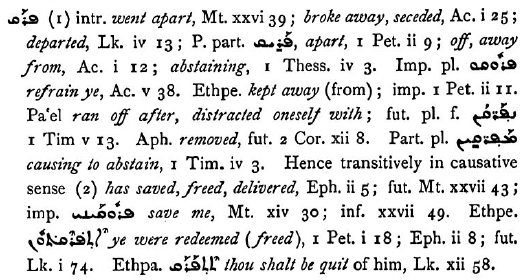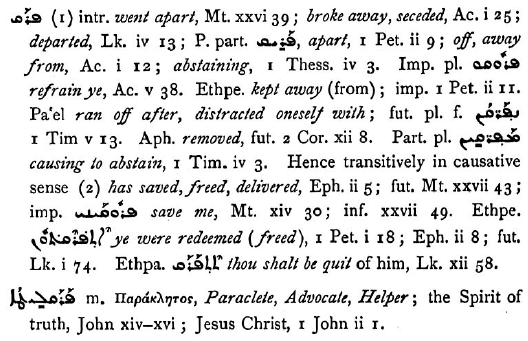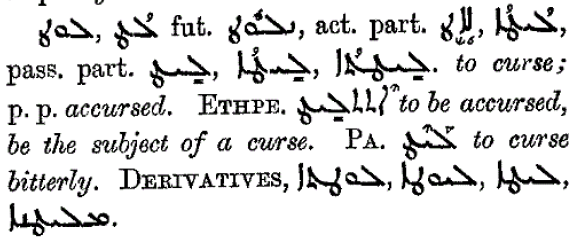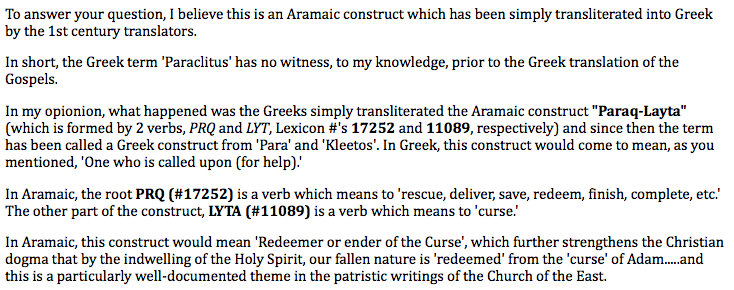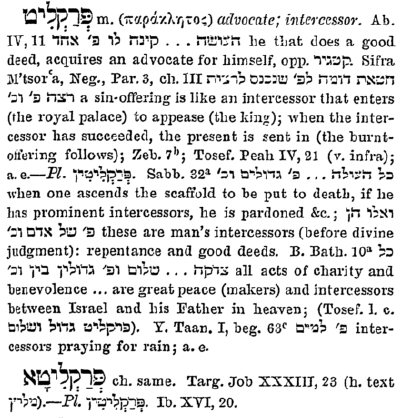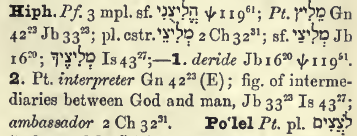In my last post I protested at Brian Simmons translating παράκλητος as ‘Savior’ in John 14.16. His first justification for doing so is that he thinks the term sums up the role of the Holy Spirit:
to protect, defend, and save us from our self and our enemies and keep us whole and healed.
What he does not say is that the Holy Spirit saves us from our sins. But this is, most of all, what we need saving from, and this is why the Lord Jesus was given His holy Name, because He would save us from our sins (Matthew 1.21).
Moreover, Simmons is not translating here. He is rewriting the Holy Bible. He seems to think that he can improve on what the Lord Jesus Himself said about the Holy Spirit!
In this post I look at Simmons’ second justification for rendering παράκλητος as ‘Savior’. He says that the Aramaic word which stands in its place, paraqlēṭā, means ‘a redeemer who ends the curse’:
I will attempt to show, I think convincingly, that on the contrary the Syriac word ܦ݁ܲܪܲܩܠܹܛܵܐ (paraqlēṭā) is a Greek loan-word, being simply a transliteration of παράκλητος, and meaning either ‘advocate’ or ‘comforter’.
where did simmons get this etymology from?
Simmons almost certainly derives his idea that ܦ݁ܲܪܲܩܠܹܛܵܐ has an Aramaic rather than a Greek derivation from Paul Younan, either directly from a footnote in Younan’s online ‘Peshitta Aramaic/English Interlinear New Testament’, or indirectly through Andrew Roth’s ‘Aramaic English New Testament’.
Younan translates the word as ‘Redeemer’ in John 14.16 (also in John 14.26, 15.26, 16.7):
In the footnote, he claims that the word
has been confused with the Greek “Paraclitus”, meaning “Advocate.”
His dictionary references are exactly those given later by Simmons. In addition he references Mark 11.21 and Matthew 5.44. In his notation, the + symbol stands for ܛ (ṭeth):
In John 14.16, as well as in John 14.26, 15.26, and 16.7, Roth also translates the word as ‘Redeemer’:
He reproduces Younan’s footnote almost verbatim, including the incorrect transliteration of παράκλητος (paraklētos), and acknowledges his source with the initials PY. (He alters the last sentence somewhat, replacing ‘our fallen nature has been redeemed’ with ‘our sinful predisposition has been redeemed’.) Roth adds a further comment that:
By ending the curse, Mashiyach as savior (paroqa), more literally fulfills the office of Mashiyach as the “giver of lives.”
I am not sure what Roth means by his comment. On the one hand, he has just quoted Younan to the effect that ܦ݁ܲܪܲܩܠܹܛܵܐ (paraqlēṭā) means ‘One who ends the curse’. On the other, he can hardly be referring to the Holy Spirit as the Messiah. Whatever he does mean, he does seem to be referring to the One who ends the curse as ‘savior’, so this may be a possible source of Simmons’ use of the word ‘Savior’ in John 14.16.
does younan’s etymology stand up?
Younan argued that ܦ݁ܲܪܲܩܠܹܛܵܐ is a compound of ܦܪܩ (PRQ, Pe-Resh-Qof) and ܠܛܐ (LṭA, Lamadh-ṭeth-Alaf).
He gives the meaning of ܦܪܩ as ‘to end’, ‘to finish’, ‘to save’, and cites Strong’s Concordance #6561 and #6562 in support. This strikes me as extremely odd, since this is a Hebrew dictionary not an Aramaic one. For what it is worth, here are Strong’s definitions of the two Hebrew words פָרַק and פְרַק (which are both indeed formed with the equivalent Hebrew consonants, Pe, Resh, and Qof):
פָרַק can mean ‘to deliver’, and ‘פְרַק‘ means ‘to discontinue’, according to Strong, and these are similar to the meanings Younan is claiming for ܦܪܩ .
But what is needed is the meaning of the word in Aramaic, not in Hebrew. Jennings (p. 180) gives the following definitions (the script is Serto, which is more rounded):
The word can mean ‘has saved, freed, delivered’, and it can also mean ‘removed’.
It is of interest to note that immediately after ܦܪܩ in Jennings comes our word ܦ݁ܲܪܲܩܠܹܛܵܐ :
It is listed as a loanword from Greek, with meaning ‘advocate’ or ‘helper’. Is it possible that Younan cited a Hebrew dictionary for the meaning of an Aramaic word to avoid drawing attention to what the Aramaic dictionaries say about the meaning of ܦ݁ܲܪܲܩܠܹܛܵܐ ?
the meaning of ܠܛܐ (LṭA)
For ܠܛܐ (LṭA), Younan cites Mark 11.21 which reads in the Peshitta:
ܘܶܐܬ݁ܕ݁ܟ݂ܰܪ ܫܶܡܥܽܘܢ ܘܶܐܡܰܪ ܠܶܗ ܪܰܒ݁ܺܝ ܗܳܐ ܬ݁ܺܬ݁ܳܐ ܗܳܝ ܕ݁ܠܳܛܬ݁ ܝܶܒ݂ܫܰܬ݂
‘wettəddəḵar šemᶜon wemmar lēh rabbī hā tīttā hāy dəlāṭt yeḇšaṯ’
‘And Simon remembered, and said to him: Rabbi; behold, the fig-tree which thou cursedst, is dried up’ (Murdock)
The lexeme is ܠܘܛ (LWṭ, Lamadh-Waw-ṭeth) not ܠܛܐ (LṭA), as can be see from the Peshitta Analysis Tool for the verse, along with the analysis of the word itself. Jennings gives the form as either ܠܘܛ or simply ܠܛ (Lamadh-ṭeth), and cites Mark 11.21 as well as Matthew 5.44, which is the other verse that Younan makes reference to:
As for Younan’s dictionary definitions, there is nothing relevant on p. 236 of the 1903 edition of Mrs. Margoliouth’s Compendious Syriac Dictionary. It is possible that he is using a different edition, or it may be that the reference should have been to page 237 following, where there is an entry for ܠܘܛ not dissimilar to that of Jennings, with ܠܛ again given as an alternative form:
In passing, the same dictionary treats ܦ݁ܲܪܲܩܠܹܛܵܐ as a loanword from παράκλητος, with meaning ‘advocate’, ‘intercessor’, ‘Comforter’:
I have not been able to find in ancient Syriac the root ܠܛܐ (LṭA, Lamadh-ṭeth-Alaf) that Younan claimed to exist. A search in the Comprehensive Aramaic Lexicon brought up only longer words beginning with these three consonants ( ˀ is the Unicode symbol for alaf):
oraham’s dictionary
Finally, Younan appeals to p. 250 of Oraham’s Dictionary for support for his thesis. Here we do find an entry for the form ܠܛܐ (LṭA):
But Oraham’s dictionary is for neo-Aramaic, or what he calls the Assyrian Language of the twentieth century. It is I think little more fit to the purpose of ascertaining the meaning of a word in the Peshitta, than is a Hebrew dictionary.
In passing, Oraham (p. 417) includes our word, with the addition of a Yodh after the Lamadh, in his dictionary, with meaning ‘intercessor’, or ‘advocate’, or mediator:
assessment of younan’s theory
Once allowance has been made for one or two inaccuracies, we are left with ܦܪܩ (PRQ), which can mean ‘has saved, freed, delivered’, or ‘removed’; and ܠܘܛ (LWṭ) or ܠܛ (Lṭ) meaning ‘to curse’. I don’t know etymology, but I rather suspect that it is an inexact science, and that there is no reason in principle why our word ܦ݁ܲܪܲܩܠܹܛܵܐ (paraqlēṭā) could not have arisen from these two constituent parts.
Younan is a member of the Church of the East and holds to their belief that the New Testament was written in Aramaic. He says that while the ‘vast majority of Christian denominations’ believe that the New Testament was written in Greek:
The Church of the East has always rejected this claim. We believe that the Books of the New Testament were originally penned in Aramaic, and later translated into Greek…
But if the Aramaic were the original, and if ܦ݁ܲܪܲܩܠܹܛܵܐ meant ‘redeemer’, why would the Greek translators render it with παράκλητος, which meant ‘advocate’ or ‘intercessor’, according to Liddell and Scott’s classical Greek lexicon?
In 2001, in reply to a question on the subject, Younan opined that the word had been transliterated from an Aramaic original into Greek by the translators. He thought that there was no evidence that this Greek word “Paraclitus” had existed prior to the posited 1st century translation. It had then, he suggested, been misunderstood as ‘a Greek construct from “Para” and “Kleetos”‘. In this post, Younan has the second verb as LYT or LYTA, with a Yodh as the second consonant, rather than as LTA as in the footnote to his translation. He thought that to speak of the Holy Spirit as ‘Redeemer’ was in accord with patristic writings of the Church of the East:
παράκλητος prior to the 1st century ad
In fact, Younan was mistaken in supposing that παράκλητος is not attested prior to the 1st century AD. Liddell and Scott cite its use by the orator Demosthenes in the fourth century BC, with the meaning ‘advocate’: 1
ἐνθυμουμένους ὅτι ταῦτα μέν ἐσθ᾽ ὑπὲρ ὑμῶν καὶ ὅλης τῆς πόλεως,
‘You will reflect that justice and the oath concern yourselves and the commonwealth,
αἱ δὲ τῶν παρακλήτων αὗται δεήσεις καὶ σπουδαὶ τῶν ἰδίων πλεονεξιῶν εἵνεκα γίγνονται, ἃς ἵνα κωλύηθ᾽ οἱ νόμοι συνήγαγον ὑμᾶς, …
whereas the importunity and party spirit of advocates serve the end of those private ambitions which you are convened by the laws to thwart, …’
The entry for παράκλητος in BDAG gives further examples of usage prior to the 1st century AD. For example, in his Roman Antiquites (Book I, Chapter 37.1), Dionysius of Halicarnassus wrote: 2
ὡς δὲ ταῦτ᾽ ἤκουσαν, ὅσοι μὲν ἦσαν ἀκέραιοί τε καὶ τῶν τὰ δίκαια λεγόντων παράκλητοι
‘When they heard this, all who were unprejudiced and ready to be advocates for those who plead the cause of justice
τὰς χεῖρας ἄραντες εἰς τὸν οὐρανὸν ἀνέκραγον ὀδυρμῷ καὶ ἀγανακτήσει μεμιγμένην κραυγήν, …
held up their hands to heaven and raised an outcry of mingled lamentation and resentment, …’
παράκλητος in philo of alexandria
BDAG lists ten or more occurrences of παράκλητος in the works of Philo of Alexandria, who was born around 15 BC and died sometime after 41 AD:
In Against Flaccus, Philo first of all (11-12) describes how Macro had acted as an intercessor before Tiberius on behalf of Gaius (Caligula). Accordingly at 13 he refers to ‘Macro the intercessor’ (παρακλήτῳ Μάκρωνι):
ὑφ᾽ ὧν ἀπατηθεὶς ἔλαθεν ἄσπονδον ἐχθρὸν έαυτῷ καὶ υἱωνῷ καὶ γένει καὶ παρακλήτῳ Μάκρωνι καὶ πᾶσιν ἀνθρώποις καταλιπών,
‘Deceived by these representations Tiberius unwittingly left behind him an implacable enemy to himself, his grandson, his family, Macro the intercessor and all mankind.’
Tiberius died (37 AD) and (§16) Gaius, who had become Emperor in his place, put to death Macro, the very man who had interceded for him. 3 Flaccus, the prefect of Alexandria, who had been in the favour of Tiberius, and a friend of Macro, now needed someone to intercede for him before Gaius. A delegation came to Flaccus arguing that he needed an intercessor (παράκλητον) to appease Gaius, and proposing that the city of Alexandria should become that intercessor (παράκλητος). The city would intercede (παρακλητεύσει) for him in exchange for him turning against the Jews:
δεῖ δὴ παράκλητον ἡμᾶς εὑρεῖν δυνατώτατον, ὑφ᾽ οὗ Γάιος ἐξευμενισθήσεται.
‘We must find you a really powerful intercessor to propitiate Gaius
ὁ δὲ παράκλητος ἡ πόλις Ἀλεξανδρέων ἐστίν, ἣν τετίμηκε μὲν ἐξ ἀρχῆς ἅπας ὁ Σεβαστὸς οἶκος, διαφερόντως δ’ ὁ νῦν ἡμῶν δεσπότης.
Such an intercessor is the city of the Alexandrians which has been honoured from the first by all the Augustan house and especially by our present master;
παρακλητεύσει δὲ τυχοῦσά τινος παρὰ σοῦ δωρεᾶς·
and intercede it will if it receives from you some boon, …᾽
παρακλητεύω means ‘to act as advocate’ or ‘to act as intercessor’, and is clearly a denominative verb (formed from a noun) from παράκλητος.
Philo uses παράκλητος in a different sense in On the Creation. At §23, during an exposition on how God created the world, he speaks of God as having no counsellor (παρακλήτῳ) to help Him:
Οὐδενὶ δὲ παρακλήτῳ—τίς γὰρ ἧν ἕτερος; —μόνῳ δὲ αὑτῷ χρησάμενος, ὁ θεὸς …
‘Now God, with no counsellor to help Him (who was there beside Him?) …’
two meanings of παράκλητος
BDAG distinguishes between two etymologies of παράκλητος, from two meanings of the verb παρακαλέω. On the one hand, the verb can mean ‘to call to one’s side’. On the other, it can mean ‘encourage’, ‘exhort’, ‘comfort’. From the passive sense of the first meaning comes the idea of a person called to someone’s side. The person called to one’s side could act as counsellor and adviser on the one hand, or as advocate on the other. In 1 John 2.1, where Jesus Christ is described as our παράκλητον … πρὸς τὸν πατέρα, the meaning would seem to be ‘advocate’.
From the active sense of the second meaning could come, at least in principle, the idea of someone who encourages, exhorts and comforts. But I see that BDAG itself does not give this as a meaning of the word. Rather, they give as a definition ‘one who appears in another’s behalf’, and as English equivalents ‘mediator’, ‘intercessor’, ‘helper’:
They do however point out that in the 2nd century AD both Aquila and Theodotion translated מְנַחֲמים (‘comforters’) in Job 16.2 as παράκλητοι.
Ephraem the syrian
According to BDAG, the early Greek commentators understood παράκλητος in the active sense, as equivalent to παρακαλῶν (the nominative singular masculine present tense participle of παρακαλέω) or παρακλήτωρ (‘comforter’, used in Job 16.2, LXX). BDAG adds that Ephraem the Syrian (c. 306 – 373 AD), who wrote in Syriac, also understood the word in this sense:
The reference is to Rendell Harris’ ‘Fragments of the Commentary of Ephrem Syrus upon the Diatessaron’ (London: Clay, 1895) at page 86, where there is a fragment of Ephrem’s remarks on John 14.16, as best Harris could reconstruct them:
At that time, Ephrem’s Commentary on the Diatessaron had been found only in an Armenian version, which had been further translated into Latin by R. Aucher and edited by G. Mösinger. 4 With regard to the text on the left, Lewis and Short give the meaning of ‘consolator’ as ‘one who consoles, a comforter’:
‘Alium paraclitum mitto ad vos: i.e. consolatorem.’
then means:
‘I send another paraclete to you: that is, a comforter.’
Even allowing for translation through Armenian and Latin, Ephraem’s original must have meant something like ‘comforter’, and not ‘redeemer’ or ‘saviour’. The very fact that he felt the need to explain the meaning of ܦ݁ܲܪܲܩܠܹܛܵܐ to his Syriac readers is I think more consistent with it being a Greek loan-word than of native origin. If it were a compound of ܦܪܩ and ܠܛܐ , as Younan once argued, Ephrem could have said so, but he did not.
ishoˁdad of merv
The text on the right at Harris p. 86 above is from the Commentaries of Ishoˁdad of Merv, who served as bishop of Hedatha for the Church of the East in the ninth century. His commentaries were edited and translated by Margaret Gibson. He quotes Ephraem frequently, as for example, in a comment on Luke 11.24-26: 5
ܡܪ ܐܦܪܝܡ (Mar Ephraim) is written in the reddened colour, as represented by the italics in the English translation: 6
At John 14.16, however, Ishoˁdad does not say explicitly that he is quoting Ephrem or anyone else. In his Introduction, Harris says (p. 11) that the whole commentary is largely of the nature of a Catena, which is to say that it is made up of excerpts from earlier commentators. But, Harris explains, the authors quoted are only sometimes indicated by a rubricated (reddened) name:
As I understand it, therefore, it is a matter of judgement whether the following extract from Ishoˁdad’s Commentary derives in whole or in part from Ephrem:
Our word ܦܪܩܠܛܐ (paraqlēṭā) can be seen in line 1 (7th from right), line 4 (4th), line 5 (2nd, 6th), and the last line (4th). Gibson translated this passage as:
Ishoˁdad explains ܦܪܩܠܛܐ first as ‘Teacher and Comforter’. The Syriac word translated ‘comforter’ is ܡܒܝܐܢܐ (Mem-Beth-Yodh-Alaf-Nun-Alaf, mḇayyānā). It can be seen in line 2 (2nd from right), and occurs again in the last line (6th from right), where ܦܪܩܠܛܐ is ‘explained as’ ܡܒܝܐܢܐ . It was used in the Peshitta in Romans 12.8 to translate ὁ παρακαλῶν:
εἴτε ὁ παρακαλῶν ἐν τῇ παρακλήσει· … [NA 28]
or he who exhorts, in his exhortation … [NASB]
ܘܐܝܼܬ݂ ܕ݁ܲܡܒ݂ܲܝܵܐܢܵܐ ܗܘܿ ܒ݁ܒ݂ܘܿܝܵܐܹܗ
he who is an exhorter, in his exhorting (Etheridge)
And there is that of a consoler, in his consoling (Murdock)
It was used in the Old Testament Peshitta to translate מְנַחֵם
(mᵊnaḥˈēm) in Ecclesiastes 4.1 (‘… they have no comforter …’); the מְ signifies the Piel masculine singular participle, and the verb is נָחַם (nâcham), which means, in the Piel conjugation, to ‘comfort, console’ (Brown-Driver-Briggs). It translates נָחַם also in Psalm 77.2 (‘… my soul refused to be comforted’). Its meaning is given as ‘a comforter, consoler’ in J. Payne Smith:
and as ‘a consoler, exhorter’ in Jennings:
Whereas ὁ παρακαλῶν could be either a comforter or an exhorter, מְנַחֵם seems to correspond more to the comforting or consoling idea, so ‘comforter’ seems to be a good translation of ܡܒܝܐܢܐ , as Gibson has it.
Given that Ephrem had given an explanation in Syriac of the meaning of ܦ݁ܲܪܲܩܠܹܛܵܐ , and given that Ishoˁdad had Ephrem’s Commentaries, and given what Sebastian Brock calls Ephrem’s ‘enormous reputation’, 7 it may be considered less than probable that Ishoˁdad would give an explanation different from that of Ephrem. So I find myself more or less convinced that Harris is right and that Ephrem explained ܦ݁ܲܪܲܩܠܹܛܵܐ as ܡܒܝܐܢܐ (mḇayyānā). Even if he did not, we have the evidence through the Armenian version that he used a word with broadly the same meaning of ‘comforter’.
It is one thing, under Younan’s scenario in which παράκλητος originated as a transliteration of ܦ݁ܲܪܲܩܠܹܛܵܐ meaning ‘redeemer from the curse’, to suppose that Greek speakers came to misunderstand the word and to imagine that it derived from παρακαλέω. It is another to suppose that this misunderstanding filtered back into the Syriac speaking churches, so that by the fourth century their leading scholar Ephrem no longer knew its true meaning. This seems rather far-fetched.
in the mishnah and targums
BDAG states that Jews adopted παράκλητος as a loanword:
The Pirqe Aboth (Chapters of the Fathers), the earliest section of the Mishnah, was put into written form in the middle of the second century AD. At 4.15 (= 4, 11 in BDAG), as translated by Charles Taylor, Rabbi Liʿezer ben Jacob is quoted as saying that he who performs one precept has gained for himself one advocate (פְּרַקְלִיט, pᵊraqlīyt) whereas he who commits one transgression has gained for himself one accuser. פְּרַקְלִיט is on the second line, first from right: 8
Taylor comments that the word is παράκλητος in Hebrew form:
Liʿezer ben Jacob lived in the second century AD. It seems highly improbable that the word could have meant ‘redeemer from the curse’ in Aramaic and Greek Christian communities in the first century, changed its meaning in Greek in Christian to ‘advocate’ or comforter’, and then passed into Hebrew with the new meaning in non-Christian Jewish communities in the second century.
Other instances of the use of this Hebrew word in the Mishnah and the Talmud are to be found in Jastrow, who categorises it as a loanword from παράκλητος and gives the meaning as ‘advocate’, ‘intercessor’. He has a separate entry for the Chaldean Aramaic) word פְּרַקְלִיטָא (pᵊraqlīytāʾ), with the same derivation and meaning, and references to the Targums: 9
פְּרַקְלִיטָא in the targum of job
The Hebrew text of Job 33.23 reads:
אִם-יֵשׁ עָלָיו, מַלְאָךְ–מֵלִיץ, אֶחָד מִנִּי-אָלֶף: לְהַגִּיד לְאָדָם יָשְׁרוֹ
As pointed out by Jastrow, the word rendered by פְּרַקְלִיטָא in the Targum is מֵלִיץ (mēlīyts). It is the Hifʿil masculine singular participle of לִיץ (līyts). In this form, as given by Brown-Driver-Briggs, it means ‘interpreter’ or ‘ambassador’ or ‘an intermediary between God and man’, that is, a ‘mediator’:
In Job 33.23, it is most often translated into English as ‘mediator’:
׳If there is an angel as mediator for him, One out of a thousand, To remind a man what is right for him,׳ [NASB]
As already stated, it was translated into Aramaic as פְּרַקְלִיטָא in the rabbinic Targum of Job at verse 33.23 (p. 223*). The targum is marked by multiple translation, a ‘phenomenon particularly associated with the Targum of Job’. פְּרַקְלִיטָא occurs twice in the second line:
The idea of ‘mediator’ is close to that of ‘advocate’, ‘intercessor’. It is different to that of a redeemer from a curse.
According to Martin McNamara, a leading expert on the Targums, all the Targums of the Hagiographa, apart from Proverbs, and thus including Job, are (p. 316): 10
basically in Palestinian Aramaic
Dating the Targums is complex (pp. 118-141) and difficult. It may be that what we have is a late compilation of mainly early material. Perhaps all we can really say is that this use of פְּרַקְלִיטָא in the Targum of Job adds to the difficulty of Younan’s theory, which requires that the word meant one thing in the land of Israel at the time of Jesus, and another thing amongst rabbinical Jews in the same general area at a later date, and that the change had taken place via the Greek language and the Christian faith.
younan changes his mind
In 2011, about ten years after he had defended it in one forum, Paul Younan admitted in another that he had more or less changed his mind about the validity of his theory:
He referred in particular to the use of ‘this loanword from Greek’ within the ‘Jewish milieu’, no doubt having in mind its use in the Mishnah and the Targums. He said that he might remove his footnote, and perhaps revise the translation to:
translate this phrase as “Intercessor” or “Advocate”.
Praise the Lord for that. I hope that he will indeed do so, in the light of what he calls the:
weight of the historical evidence.
Andrew
Notes:
- Demosthenes, 19.1, On the False Embassy. Greek text. English text. ↩
- Dionysius of Halicarnassus, Roman Antiquities, 11, 37, 1. Greek text. English text. ↩
- Or forced him to commit suicide, according to another account. ↩
- R. Aucher, G. Moesinger, ‘Evangelii Concordantis Expositio Facta A Sancto Ephraemo Doctore Syro’ (Venice: 1876). ↩
- ‘The Commentaries of Isho’dad of Merv’, ed. and trans. by Margaret Gibson. Vol III: Luke and John in Syriac. (Cambridge: University Press, 1911) p. 201. Link. ↩
- ‘The Commentaries of Ishoˁdad of Merv’, ed. and trans. by Margaret Gibson. Vol I: translation. (Cambridge: University Press, 1911) p. 173. Link. ↩
- Brock, The Bible in the Syriac Tradition, 1st ed., 63. ↩
- C. Taylor, ‘Sayings of the Jewish Fathers’ (Cambridge: University Press, 1897) pp. 69-70; p. (27) from right for Hebrew text. Link. ↩
- M. Jastrow, ‘A dictionary of the Targumim, the Talmud Babli and Yerushalmi, and the Midrashic literature’, Vol. II, (London: Luzac, 1903) p. 1241. ↩
- M. McNamara. ‘Targum and Testament revisited : Aramaic paraphrases of the Hebrew Bible : A light on the New Testament’. (Grand Rapids: Eerdmans, 2010) 316. ↩







